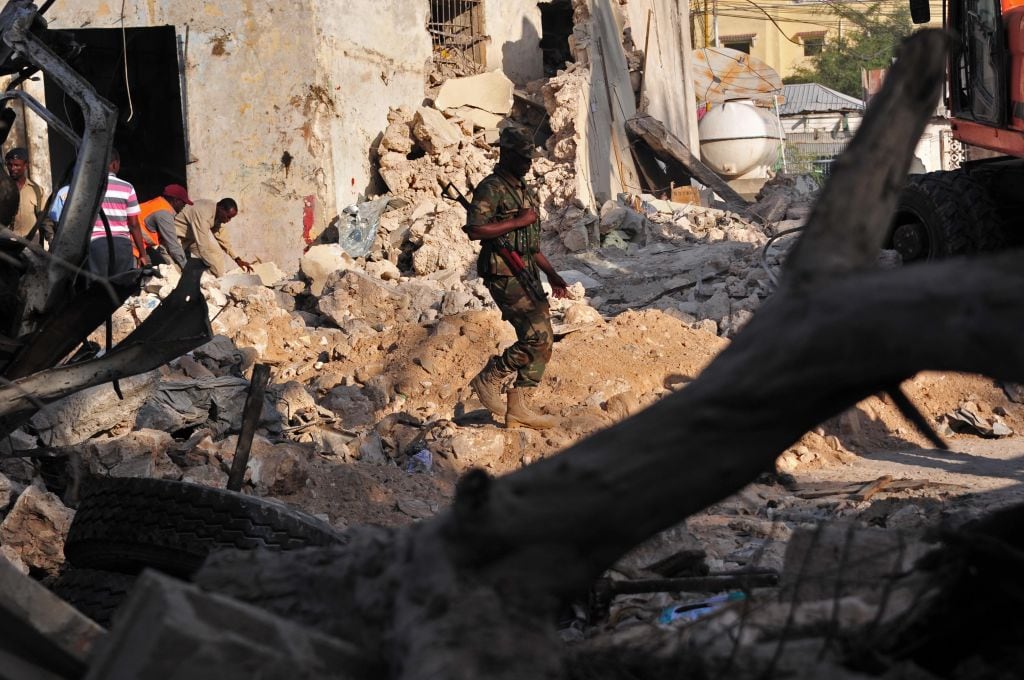When Donald Trump was elected U.S. president, speculation as to what this meant for African security was rife. The uncertainty persists among policymakers and analysts alike. But the indicators are already there, if anyone cares to look.
President Trump announced to the U.N. General Assembly that he had “changed the rules of engagement in our fight against the Taliban and other terrorist groups.” In making such a statement, the new playbook for American counterterrorism became open to rule changes. An October firefight in Niger between militants affiliated with the Islamic State group and forces from the U.S. and Niger showed that American Green Berets were already on the ground in Africa, fighting an underreported war against terrorists. The collapse of ISIS in the Middle East and the end of large-scale military operations in Iraq and — in the Near East — Afghanistan has resulted in a trickle of military refocus to Africa. Reports of ISIS-linked individuals spreading throughout Africa, searching for ties and funding, combined with the recent reports of a Niger firefight between Green Berets and violent extremists are proof enough that Africa is not only the next battle space for the United States, but that it has already begun.
The Islamic State group’s second home
The threat of radical militant groups in Africa has grown considerably in recent years. The persistence of Boko Haram, AQIM and ISIS-linked groups ranges virtually the entire continent. With the exception of southern Africa, there is no single region unaffected by significant terrorist threats, both active and emerging. Many African police services have struggled to combat regular sources of crime, let alone radical extremism. Even in South Africa, a secure hegemony — arguably — the police minister requested military assistance to combat gangs in Cape Town. What hope then of regular security forces countering violent terrorism?
American counterterrorism policy under U.S. President Barack Obama tended to possess an expeditionary attitude about it. Limited raids supplemented by widespread use of drone strikes certainly contributed to the body count but did little to curtail the expansion of terrorism groups. Although killing enemy terrorists may seem like a productive use of American military force and taxpayer dollars, many African extremism hubs not only remain active locally but actively seek international terrorism links through financing, training and the creation of global networks that threaten U.S. borders. In the fight against terrorism, drone warfare provided the period at the end of a sentence that should be filled in by highly skilled, highly motivated troops on the ground.

In this insecure landscape, American counterterrorism strategy could leverage a Trump administration eager to get stuck into counterterrorism to expand its operations in Africa. This could mean offering preemptive counterterrorism services to willing partner nations. Put in a nutshell, the United States has a chance to stop violent extremism in Africa from metastasizing into a larger, international threat.
This is not to say American forces ought to run roughshod over existing African regional mechanisms dealing with the rise of violent extremism. Rather, there could and perhaps should be a move toward carving out a niche for American military power alongside its regional partners. This already exists in West and Central Africa.
RELATED

African regional organizations conduct their own intelligence and counterterrorism operations much the same as the United States. The average U.S. Africa Command communications officer would likely even point to several examples of cross-organizational cooperation. But with the gloves off, as it were, this should move beyond a convenient public relations bullet point and manifest into a truly homogeneous military relationship. Much like how the British managed to work alongside American forces in Operation Iraqi Freedom and Operation Enduring Freedom independently but for a common strategic good, this formalized relationship is a valuable example to emulate with African counterparts, from presidents down to the ordinary rifleman.
African problems are not Middle Eastern problems
Critics of American military power in Africa often caution of the shadow war being conducted on the continent. Hyperbole-laden allusions to secret assassination missions and remote operations that Americans do not know about is an unfair assessment of American operations in Africa. Often, American criticism of African operations stem from an inherent understanding of just what the African battle space is. This would explain to a large degree the constant comparison of African violent extremism to Middle Eastern counterparts. This is a poor analysis of the strategic situation, and it manifests in a harsh examination of American forces involved therein.
AFRICOM conducts scores of training exercises with African counterparts at all levels. From senior staff officers to the average rifleman, AFRICOM has utilized American troops in training and equipping local African forces for a tough fight. Although special forces operations in Africa are largely kept a secret, it would be fair to presume that American elite troops have been busy in East Africa and, as the Niger ambush illustrated, further afield. More to the contradiction of those comparing AFRICOM’s operations to a shadow war, the American presence in Africa, covert and public, are executed with the permission of their host nations. Unlike the Middle East, where military forces were embroiled in unilateral, coalition-based counterinsurgencies spanning entire countries, African operations are small, surgical operations, either combat or humanitarian in nature, but almost exclusively short-lived. The Middle Eastern counterinsurgency approach of clear, hold, build has given way in Africa to a bilateral series of missions, training, partnerships and, in certain cases, funding all aimed at clearing the roots of violent extremism in the continent before ISIS can truly grab hold.
Africa’s burden to bear
Where does this leave African organizations? Far from being powerless, African peace-enforcement operations have highlighted a remarkable ability by local forces to affect permanent victories against belligerent forces. The successes of the African Union Mission in Somalia, or AMISOM, in isolating and starving al-Shabab in Somalia, for example, is aided in turn by the startlingly swift defeat of M23 rebels at the hands of a multinational African Force Intervention Brigade in the Democratic Republic of the Congo in 2013. Media criticism of American shadow wars heavily implies a worsening of the conflict in which U.S. forces are involved. Katrina vanden Heuvel of The Washington Post wrote:
Yet, AMISOM; the Force Intervention Brigade’s war against M23; and indeed even the Green Berets cooperating with Nigerien forces — casualties included — have shown precisely the opposite to be true. Where America partners with African forces or operates with their blessings, results are tangible. Critics applying a Middle Eastern blueprint upon Africa as an excuse for misunderstanding the continent’s own unique conflict matrix is lazy. And likewise, predicting doom for American operations therein is equally flawed.
US-African solutions to global problems
The challenges facing American and African war fighters can be boiled down to three essential requirements:
- The mastery of Africa’s vast and varied physical and human geography.
- The equipping and funding of local forces to meet their foes.
- The training to execute the tasks required of them.
In all three aspects, American forces are already involved in Africa, aiding willing nations both in terms of training and mentorship, and they are on the ground, patrolling side-by-side to provide a security blanket in historically insecure regions.
AMISCOM and the Force Intervention Brigade have already shown just how much progress can be made against violent extremists groups with minimal funding and external support. Thus, African organizations and their American counterparts would be well-suited to forge new partnerships in countering the next wave of ISIS-influenced violent groups. The withdrawal of American funds from African peacekeeping operations has been flagged as a crisis by organizations and think tanks directly affected by the decrease, but this could actually provide a valuable opportunity for revolutionary thinking in the creation of new, more effective security partnerships. American military involvement in Africa should not be explained as a shadow war-type of bogeyman, but rather as an ongoing, committed counterterrorism partner that can prove to be the key to unlocking a true barrier to the spread of ISIS-inspired terrorist groups.
Ivor Ichikowitz is the founder and chairman of Paramount Group, an African-based global defense and aerospace company.








